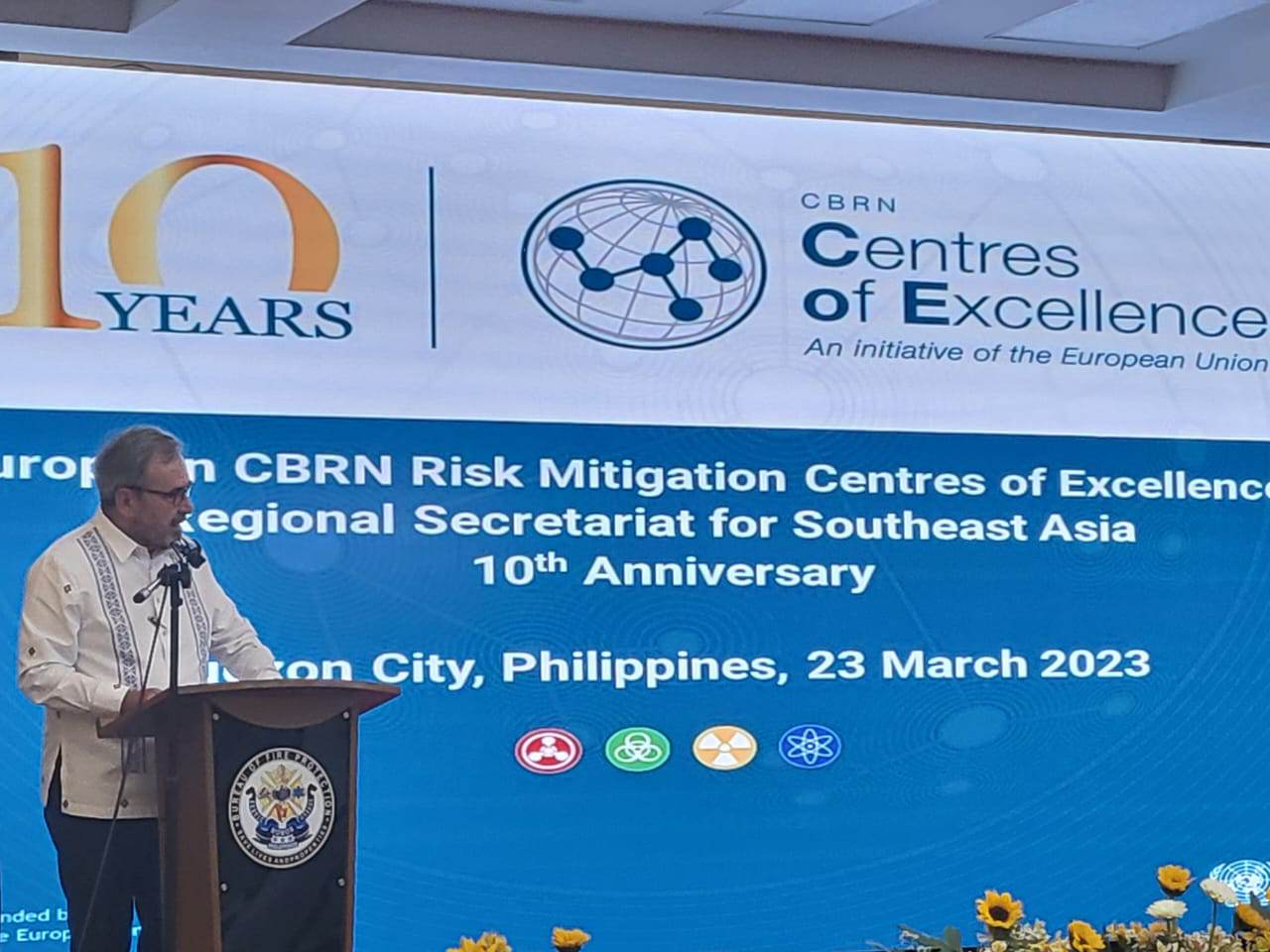
European Union Ambassador to the Philippines Luc Véron cited the long-term cooperation of the Philippine Government with the European Union and the United Nations Interregional Crime and Justice Research Institute and the Chemical, Biological, Radiological and Nuclear (CBRN) Centres of Excellence Initiative and partner countries in strengthening the region’s capacity to prevent, detect and respond to CBRN emergencies.
Ambassador Véron was guest speaker in the 10th CBRN CoE Regional Secretariat for Southeast Asia’s anniversary on 23 March 2023 held at the Bureau of Fire Protection National Headquarters in Quezon City.
Marking this important occasion, senior representatives from the Philippine Government, members of the Philippine CBRN National Team, National Focal Points representing 10 Partner Countries from across the ASEAN region, and officials from the EU and the UN gathered to celebrate a decade of successful cooperation.
The EU funds the CBRN Centre of Excellence under its cooperation instrument called Global Europe, which identifies CBRN risk mitigation as a priority to address global and trans regional threats and challenges.
Ambassador Véron said, “In the spirit of the European Union’s goal to promote peace, stability and conflict prevention, the Government of the Philippines has helped strengthen and fortify the Southeast Asia region’s capacity to collectively prevent, detect and respond to CBRN emergencies, whether natural, accidental or criminal in origin.”
“In doing so, the Government of the Philippines has helped all countries be better prepared to mitigate CBRN risks, risks that ‘do not stop at borders’,” Véron added.
According to him, the COVID-19 pandemic provides an acute example that a threat to one country is a threat to all countries.
He mentioned, “It is in this spirit of working together towards a safer and more secure world that the European Union commends the governments of the Philippines and the other ASEAN nations for their commitments as well as their coordinated approach to mitigate CBRN risks.”
CBRN CoE Regional Secretariats are located in eight regions of the world, uniting 64 Partner Countries in their shared commitment to prevent, detect and respond to CBRN emergencies, whether natural, accidental or criminal in origin.
In the ASEAN region, the CBRN CoE Regional Secretariat for Southeast Asia connects Brunei Darussalam, Cambodia, Indonesia, Lao PDR, Malaysia, Myanmar, the Philippines, Singapore, Thailand and Viet Nam in this common goal.
Since the inception of the Initiative, ASEAN countries have established inter-agency CBRN National Teams, worked to identify and prioritize critical actions for capacity-building, and engaged in more than 30 regional projects covering areas from chemical and biological security to CBRN first response training to strategic trade controls.
Noting however that a lot remains to be done, Véron explained, “There is room for improvement to coordinate more efficiently at the regional level, let alone at the trans regional level. Risks are evolving and new challenges are coming up. Technology is advancing rapidly, ranging from progress in biotechnology to the growing use and availability of drones, artificial intelligence or quantum computing. These technologies present new opportunities but also new avenues for accidents and potential misuse.“
He further added CBRN risk mitigation is connected to maritime security and safety, the protection of critical infrastructure, border and export controls, and much more.
Addressing the effects of climate change exacerbating the CBRN risk, he said, “This growing complexity is one more reason for the EU to believe that the CBRN Risk Mitigation Centres of Excellence Initiative with its holistic approach is the right way to address these challenges.”


